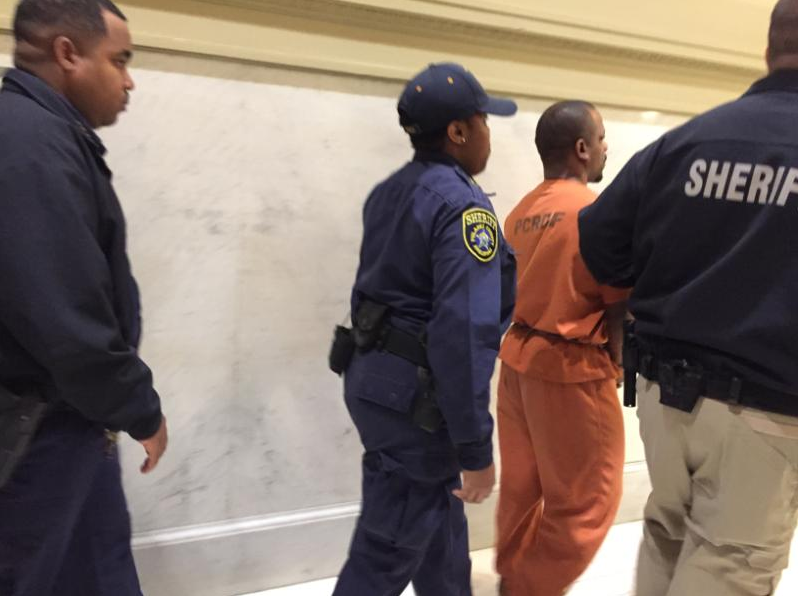The murder trial of Gary Eugene Holmes has been delayed indefinitely so the 33-year-old Little Rock man can undergo a mental examination by state doctors, a process that can take three to six months, or longer.
Holmes is accused of shooting into a car in southwest Little Rock the week before Christmas and killing a 3-year-old boy who was asleep in the back seat. He faces charges of first-degree murder and committing a terroristic act.
Ron Davis, Holmes' attorney, requested the evaluation at Holmes' arraignment Thursday after prosecutors noted that the previous lawyer who represented Holmes almost two years ago had questioned Holmes' mental health.
In April 2015, state doctors determined that Holmes was not mentally ill, a diagnosis his lawyers accepted without challenge, court records show. He was found to be anti-social and a heavy marijuana user, according to the report by clinical psychologist Ed Stafford.
Holmes has felony convictions for robbery and sexual assault, a criminal history that Stafford considered a significant indicator of Holmes' anti-social tendencies, according to his report.
"Mr. Holmes, given his legal history beginning in adolescence, meets the criteria for antisocial personality disorder, a pervasive and learned pattern of violating the rights of others in the rules of society," Stafford wrote in the eight-page report. "He also acknowledged his long-term dependence on cannabis."
In October 2015, Holmes pleaded guilty to domestic battery and terroristic threatening charges for punching his then-girlfriend at her Jacksonville home the year before.
A condition of his probation was that he continue mental health treatment, Circuit Judge Barry Sims said.
Once a defendant's mental health is called into question by his lawyer -- or in certain circumstances by prosecutors -- the judge has little authority to refuse a request for the defendant's mental assessment.
Davis was initially reluctant Thursday to ask for the evaluation, since he had signed on to represent Holmes only over the past week, but he agreed to after learning about the 2015 examination.
Mental evaluations are not uncommon for defendants who have been charged with murder or other serious crimes.
But the criminal proceedings cannot move forward and Holmes cannot be tried until the matter of his mental health is settled.
The process requires that Holmes be tested and interviewed by doctors working at the direction of the State Hospital. The examination must determine whether Holmes has a sufficient understanding of the criminal justice system so he can help his lawyer prepare his defense.
Doctors must also decide whether Holmes has any mental condition that could have compelled him to kill 3-year-old Acen King or could have prevented Holmes from understanding the difference between right and wrong when the boy was killed.
The evaluation's findings will be submitted to the judge, who has the final say on whether Holmes is competent for trial. The defense can accept the findings or challenge them, possibly by having the defendant undergo an evaluation conducted by the defense's choice of doctor.
Holmes is accused of killing Acen by firing a single shot into the car driven by the child's grandmother.
Investigators say they have at least one witness who saw Holmes get out of his car, aim at the other vehicle and pull the trigger. Acen's infant sister was also in the back seat of the car, but was not harmed, police said.
The grandmother told investigators that she didn't realize her car had been struck by a bullet or that the boy had been fatally wounded, and kept driving until she got to the shopping center where she was meeting relatives.
Holmes surrendered five days after the slaying and has been in jail since. He cannot be released on bail until the judge decides whether he is fit to stand trial.
Thursday's arraignment, typically the first opportunity for the lawyers in the case to agree on a trial date, lasted about four minutes.
In the 2015 report detailing Stafford's evaluation, Holmes is also described as having anger problems. Completing an anger management program was also a requirement of his probation.
Stafford wrote in his report that Holmes said he had a hard time keeping a job because he would "blow up and end up quitting. I can get mad enough to quit."
Holmes' only mental health treatment was as an outpatient at the Little Rock Community Mental Health Center in December 2014, where he was prescribed Prozac for depression and post-traumatic stress disorder.
Holmes told the doctor that he thought the medication was helping him. The report does not mention any ongoing mental health treatment for Holmes.
Metro on 02/17/2017

